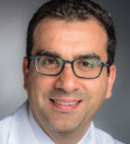The addition of pembrolizumab to neoadjuvant chemotherapy and radiotherapy (ie, total neoadjuvant therapy) failed to improve a rectal cancer–specific surrogate for survival in patients with locally advanced disease in the phase II NRG-GI002 trial.1
As reported at the 2021 Gastrointestinal Cancers Symposium, the addition of pembrolizumab improved the mean neoadjuvant rectal (NAR) score by 2.55 points vs conventional treatment, but the difference did not meet the prespecified improvement target. Similarly, key secondary and exploratory endpoints did not significantly differ, according to Osama Rahma, MD, of NRG Oncology and the Dana-Farber Cancer Institute, Boston.

“Although there was a numerical increase in pathologic complete response [with pembrolizumab plus neoadjuvant therapy], it did not reach statistical significance.”— Osama Rahma, MD
Tweet this quote
In the study, the control arm was neoadjuvant FOLFOX (fluorouracil, leucovorin, oxaliplatin) followed by chemoradiotherapy with capecitabine.
“Although there was a numerical increase in pathologic complete response, it did not reach statistical significance,” said Dr. Rahma. “The safety profile was consistent with both chemoradiotherapy and pembrolizumab. Although patients on both arms had similar chemotherapy and radiation therapy exposure, 54% of patients did not receive the planned six pembrolizumab doses.”
Study Rationale
The current treatment paradigm for locally advanced rectal cancer consists of neoadjuvant chemoradiotherapy followed by surgery and then adjuvant chemotherapy. Unfortunately, many patients—25% to 70% in some trials—never move on to adjuvant therapy. As a result, total neoadjuvant therapy has emerged as a way to ensure all patients receive enough systemic therapy.
Although total neoadjuvant therapy offers protection against locoregional relapse, long-term survival has been limited, at about 65%, Dr. Rahma pointed out. Based on the presumed immunomodulatory effects of radiation therapy, the investigators proposed that a combination of chemoradiotherapy and a PD-1 inhibitor, such as pembrolizumab, may overcome resistance and improve survival.
About NRG-GI002
Dr. Rahma reported findings from NRG-GI002, a randomized phase II clinical trial that is testing novel agents in combination with neoadjuvant FOLFOX, followed by chemoradiotherapy, in very high–risk patients with locally advanced stage II or III rectal cancer. In the first trial from this platform, the addition of the inhibitor of poly (ADP-ribose) polymerase, veliparib, did not significantly improve the NAR score vs standard total neoadjuvant therapy.
The NAR endpoint combines pathologic nodal status with tumor downstaging to reflect tumor response on a continuous scale from 0 to 100, with a lower score representing a better outcome.2 The investigators assumed that adding pembrolizumab to total neoadjuvant therapy would reduce a mean NAR score of 14.32 (derived from outcomes of prior studies) by 4.70, which would correlate with an 18% reduction in the mortality hazard and a 3.3% absolute increase in 5-year overall survival.
Of 185 randomly assigned patients, 84% completed the planned eight cycles of FOLFOX, 79% completed chemoradiotherapy according to the protocol, and 74% completed surgery and were eligible for NAR analysis. In the experimental arm, 46% of evaluable patients received the planned six doses of pembrolizumab (200 mg every 3 weeks), and 26% received five doses.
For the two treatment arms, there were no significant differences in radiotherapy fractions, dose, boost fractions or dose, and FOLFOX or capecitabine doses.
Treatment Outcomes
For the primary endpoint, patients in the control arm had a mean NAR score of 14.08, which declined to 11.53 with the addition of pembrolizumab (P = .26). “The combination of pembrolizumab and chemotherapy after FOLFOX did not lead to an improvement in NAR score compared with FOLFOX followed by chemoradiotherapy. There was a numerical increase in pathologic complete response, but it did not reach statistical significance,” Dr. Rahma said.
The secondary endpoints were similar between the arms, as reported here for the control and pembrolizumab arms, respectively:
- Pathologic complete response: 29.4% vs 31.9% (P = .75)
- Clinical complete response: 13.6% vs 13.9% (P = .95)
- R0 resection: 89.4% vs 94.0% (P = .36)
- Sphincter-sparing surgery: 71.0% vs 59.4% (P = .15).
Grade ≥ 3 adverse events occurred more often in the pembrolizumab arm during chemotherapy (51% vs 41%, respectively, including one death in each group), during chemoradiotherapy (48% vs 37%), and postoperatively (36% vs 24%).
“Ongoing genomic and immune correlative studies will further explore immune resistance mechanisms and inform future total neoadjuvant therapy arms,” Dr. Rahma said. The disease-free and overall survival data are not mature and will be presented in the future.
DISCLOSURE: Dr. Rahma has served in an advisory role for Outcomes4me; has received honoraria from Alaunus Global, Clinical Care Options, Leerink, Merck, MI Bioresearch, and PRMA Consulting; has served as a consultant or advisor to Alcimed, Bayer, Celgene, Defined Health, Five Prime Therapeutics, Genentech, Gfk, GSK, Imvax, Leerink, Maverick Therapeutics, Merck, PureTech Health, Putnam Associates, and Sobi; has received research funding from Merck; has received institutional research funding from Amgen; holds institutional intellectual property in “DFCI 2386.010” and “PD-1/PD-L1”; and has been reimbursed for travel, accommodations, or other expenses by Clinical Care Options, Genentech, Merck, PRMA Consulting, and PureTech Health.
REFERENCES
1. Rahma OE, Yothers G, Hong TS, et al: NRG-GI002: A phase II clinical trial platform using total neoadjuvant therapy in locally advanced rectal cancer—Pembrolizumab experimental arm primary results. 2021 Gastrointestinal Cancers Symposium. Abstract 8. Presented January 16, 2021.
2. George TJ Jr, Allegra CJ, Yothers G: Neoadjuvant rectal (NAR) score: A new surrogate endpoint in rectal cancer clinical trials. Curr Colorectal Cancer Rep 11:275-280, 2015.

